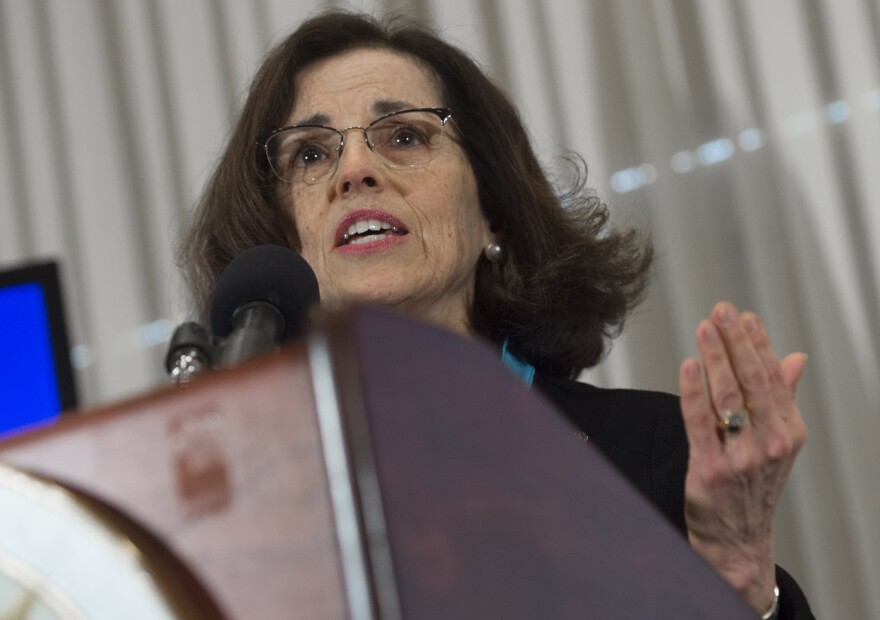All this week, Here & Now is speaking with scientists about their research and looking at issues such as science funding, education and innovation.
In part one, Here & Now‘s Jeremy Hobson speaks with France Cordova, an astrophysicist and the director of the National Science Foundation.
Interview Highlights: France Cordova
On sustainability of funding to keep the US as a scientific leader:
We always have to make our case because the taxpayers’ funding the national science foundation, and congress appropriates our money, so we are continually making our case that funding basic research is very important for the vitality, the health of the economy, and for our security and our health, to keep us a leader among nations.
Do you feel like you have enough money to keep us as a leader scientifically among nations?
No–the basic research budget has been pretty stagnant since 2003, I’d say. But the world has changed a lot since then, and other couturiers are investing more proportionally speaking. So we do need to invest a lot more in basic research because it’s the wellspring of new knowledge of how our world works.
America’s biggest science research competitors:
China is a really up and coming competitor. A couple of decades ago we were number 2 among all nations, among the OECD nations, in research intensity–that’s the ratio of R&D funding as compared to gross domestic product, and now we’re number 10. And China will probably overtake us in an absolute sense of funding in a decade from now. So yes, we’re concerned because we’re a great nation, and a great nation invests in innovation and invests in discovery and we need to make sure we keep doing that and accelerate that. We get a a lot of proposals we can’t fund. We fund about a fifth of the proposals we receive. And so, we’re leaving somewhere between 2 to 3 billion of great proposals on the cutting floor each year. And that’s a lot of innovation that’s not being realized.
On the state of US scientific innovation:
It’s pretty good. The spirit of innovation is thriving. A lot of it is spurred by the internet and all the communication and network that’s forded and the new wealth that that’s fostered. I think there’s a real flowering of innovation, especially in the technology realm, in sectors like information technology. but we are missing a couple of very important things. One thing that we’re missing is what I call inclusive innovation. There are many more people who could contribute to innovation but presently feel excluded. They’re not part of the current wave of innovation, but they have a lot to offer. So among those would be women, underrepresented groups and youth in disadvantaged areas. And the National Science Foundation is trying to address that gap with a program it calls Includes.
The second thing we’re missing is that innovation is mostly happening in selected fields like information So I think of innovations that are recent in data-science and machine learning. But there are many other areas that are not being fully explored, even though they’re ripe for that innovation. So an example of that gap would be health and medicine. there’s a lot we could do, but not all the knowledge tools are being applied. And in my own fields of physics, the mysteries are really piling up. We need to go to the next step in investigating these mysteries. Then there’s energy technology innovation. We need better battery designs for storage for example.
On NSF’s role to inspire others to be scientists:
Our motto is NSF: Where discoveries begin. I’ve extended that to say NSF: Where discoveries and discoverers begin. Many times when I go around the country, people will come up to me and say, “NSF funded my very first grant and now I’m getting funding from all these other agencies and private foundations and businesses and the like. But my first grant, my first opportunity was with the National Science Foundation. A large part of our budget goes towards science education and the science work force. We’re driven to invest in young people.
On what young people and kids can do if they’re interested in science:
Well, if their interested, they’ve already done the first thing which is to be inspired to be a scientist or engineer. There’s so much available now through all kinds of media. there’s just inspiration to be gotten everywhere. I’d just say be persistent, don’t give up. Don’t let any particular class discourage you. We’ve all taken that one course that would set us off in a way from our vision of being a scientist. I think persistence and keeping that vision in front of yourself of the magic of discovery and finding out new knowledge is an amazing thing to do as a person of any age.
On some members of Congress denying global warming:
We always take things as challenges rather than as obstacles. That’s a challenge we have to be very good communicators, and really make sure we communicate the importance of science in all its many guises. I think good science well-explained is a good antidote to people who don’t believe. It doesn’t by any means cure all because some are very resistant to that. But I’ve seen people who have claimed that they don’t believe really what they’re saying they don’t understand. We need to take the time to explain and to have good models, metaphors, analogies. I think it’s the stories and never giving up that people can come around if you explain things to them.
Guest
France Cordova, director of the National Science Foundation.
Copyright 2020 NPR. To see more, visit https://www.npr.org. 9(MDAyMTYyMTU5MDEyOTc4NzE4ODNmYWEwYQ004))



